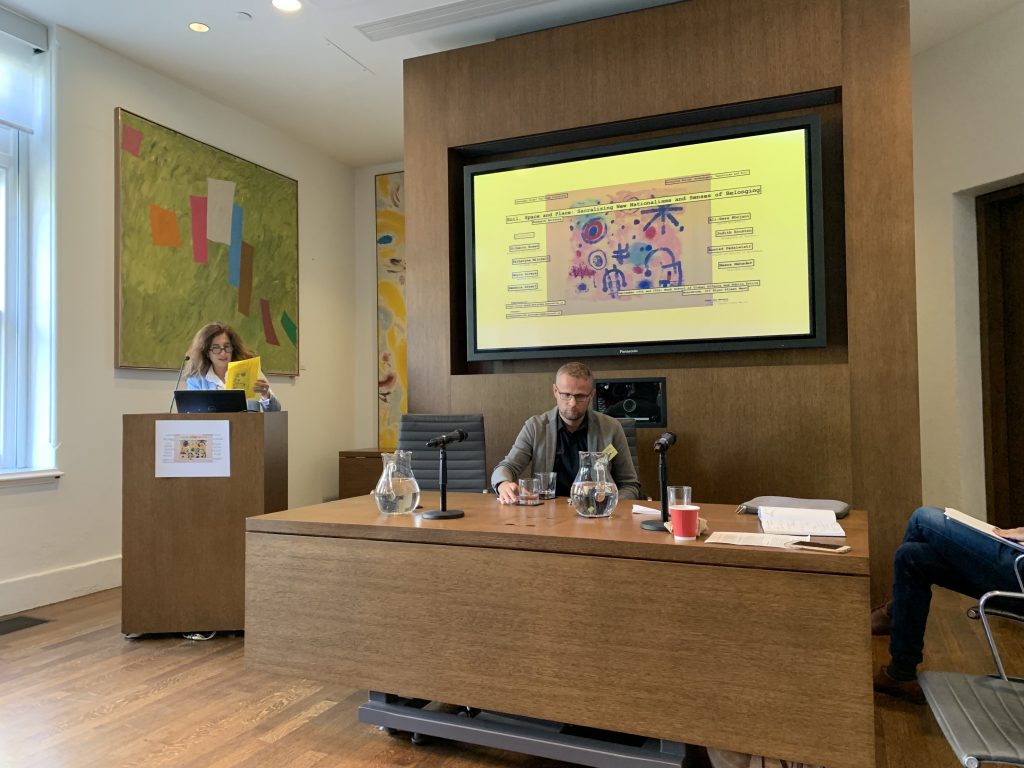by Valeria Vergani
Munk School of Global Affairs and Public Policy, University of Toronto, September 19th & September 20th, 2019
This two-day workshop, titled “Soil, Space and Place: Sacralizing New Nationalisms and Sense of Belonging” brought together international scholars from many disciplines—including anthropology, theology, religious studies, sociology, geography, and Latinx studies— around the themes of soil, space, and the sacred. Soil is entangled with new and old forms of sovereignty; but also space and place, land, territory, property, and possession, which buttress settler colonialism. Considered through a theopolitical lens, soil enriches understandings of how place is never simply “land” under legal and governmental jurisdiction, but rather is complex and always-already influenced by historical and present forms of sacralization.
The concept of land is not reducible to soil, but rather contains within itself the ways soil’s materiality manifests in relationship to social life and forms of citizenship. Rebecca Bryant highlights the aporia of belonging caught between a state of the so-called Turkish Republic of Northern Cyprus and the state of Greek Cyprus. In this contested space, landscapes shaped by dispossession and disposability are figured by the absence of a Greek title. Garbage litter also indexes differences in the affective ties to land in the north and south —disassociated from any rootedness to the land’s original Greek sovereign possession, and in turn its material relationships. A similar form of aporetic belonging is shown in the ways Gilberto Rosas engages with violence against migrants in El Paso, Texas. On the US-Mexico border, xenophobia is linked to how mass-migratory movements stir up white supremacist residues of state conquest, blood, and soil. Here, persistent, cross-border bodily movements refuse the rise of populism and totalitarianism associated with nation-state power. States are rendered into zombies when their containment efforts are continuously unsettled by the actions of migrants, who force a realignment of sovereignties. Likewise, Katharyne Mitchelle’s ethnographic work reveals how spaces of sanctuary shape the radical insurgency of migrants in Brussels, Berlin, Athens, and Lesbos, by exercising charismatic authority. Sanctuary buildings’ materialities enact a transhistoricism when faith-based actors support migrant activism, as they participate in an ecclesiastical legacy that works outside of state sovereignty to challenge liberal secular norms through heterodox and alternative relations to space and time. Alternative temporalities are also enacted in Mayra Rivera’s discussion of how soil helps in an understanding of the climate change future of US settler colonized land in Puerto Rico. Framing her engagement with interlocutors though Edouard Glissant’s poetics of the planetary, she argues that for Puerto Ricans, ecology is never only political, but also historically and materially tied to the soil. In this view, ecology extends beyond the conception of property, and is informed by a sacred relationship with the land’s materiality.
Scholars articulated the multiple convergences that emerge in a gap between the theopolitical, and the competing claims to, and practices of, sovereignty. Judith Ellen Brunton focuses on Imperial Oil, which extracts petroleum from Treaty 7 and Metis Nation of Alberta Region 3 Land. Brunton shows how Imperial Oil has used publications, ads and public relations campaigns to perform a Canadian “good life,” thereby normalizing logics of colonialism. Discussing the Imperial Oil Museum archives, she argues that an intertwined story of empire, western agrarian virtue, and citizenship is dependent on extractive economies. These white possessive logics secure a Judaeo-Christian notion of sovereignty of nation through storytelling, which includes 1980s immigration films and the sponsoring of “Hockey Night in Canada”—resulting in a theopolitics of oil that permeates everyday life.
Neena Mahadev too observes an everyday theopolitics through the growth of Pentecostalism in Sri Lanka. Buddhist and Pentecostalist movements each conceive of implanting religious sovereignty into the soil differently. Tensions of religious sovereignty result when Christian churches practices of the holy spirit, described as mushrooms, are seen to ensoil the Buddhist haptic connection to the landscape imbued with deities, one seen by Buddhists as operating under the sovereignty of the dharma. Ali-Reza Bhojani, in turn, interrogates the normative conception of Sharia Islam as law, noting how colonial imperatives have shaped the field of Islamic legal studies, resulting in an inadequate attention being paid to its theological underpinnings in Islamic literature and philosophy. His ethnographic engagements with individuals’ lived experiences of Sharia reveal its practices as part of a ritual, ethical and moral responsibility to god, rather than as inherently informing, or threatening sovereignty, state, law, and soil. Konrad Pedziwiatr extends this focus on Sharia further into a Polish context, where burgeoning nationalist sentiment is fuelled by Catholic, Islamophobic rhetoric, scapegoating Muslim individuals, in particular those of the Tatar community (who bear a long history in this territory), as a threat to sovereignty. In this way, religious theopolitics strengthen populist ideologies and intensify the sacralization of the nation state, as well as the nationalization of religion in a country which had previously attested to practicing secular governance in migration policy.

Leave a Reply